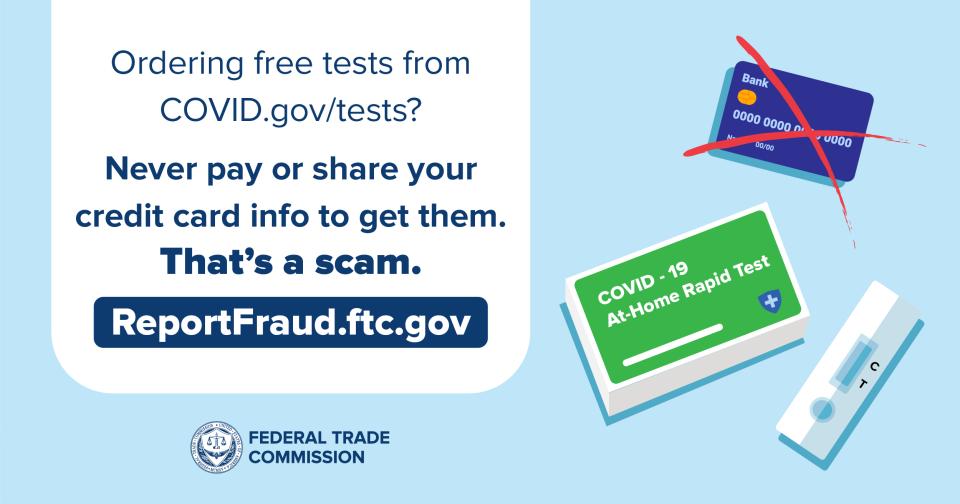 share your credit card info to get free COVID tests. That" width="960" height="504" />
share your credit card info to get free COVID tests. That" width="960" height="504" /> share your credit card info to get free COVID tests. That" width="960" height="504" />
share your credit card info to get free COVID tests. That" width="960" height="504" />
With the reopening of the federal government program to order no-cost COVID-19 tests, there are more options to get free tests this year. But how do you know what’s legit and what’s a scam? Read on.
To steer clear of scams, know that there are four ways to get FREE at-home tests:
Remember: At COVID.gov/tests , there are no shipping costs, and no need to give a credit card number or anything but your home address. (You’ll have the option to share your email if you want updates.) And, as you take stock of what tests you have and what you might need, check to see if the expiration dates of your COVID-19 tests have been extended before you throw them out.
Learn more about the latest COVID-related scam at ftc.gov/coronavirus/scams. And, as ever, if you spot a scam, tell the FTC at ReportFraud.ftc.gov .
Comments have been turned off for this consumer alert.It is your choice whether to submit a comment. If you do, you must create a user name, or we will not post your comment. The Federal Trade Commission Act authorizes this information collection for purposes of managing online comments. Comments and user names are part of the Federal Trade Commission’s (FTC) public records system, and user names also are part of the FTC’s computer user records system. We may routinely use these records as described in the FTC’s Privacy Act system notices. For more information on how the FTC handles information that we collect, please read our privacy policy.
The purpose of this blog and its comments section is to inform readers about Federal Trade Commission activity, and share information to help them avoid, report, and recover from fraud, scams, and bad business practices. Your thoughts, ideas, and concerns are welcome, and we encourage comments. But keep in mind, this is a moderated blog. We review all comments before they are posted, and we won’t post comments that don’t comply with our commenting policy. We expect commenters to treat each other and the blog writers with respect.
We don't edit comments to remove objectionable content, so please ensure that your comment contains none of the above. The comments posted on this blog become part of the public domain. To protect your privacy and the privacy of other people, please do not include personal information. Opinions in comments that appear in this blog belong to the individuals who expressed them. They do not belong to or represent views of the Federal Trade Commission.